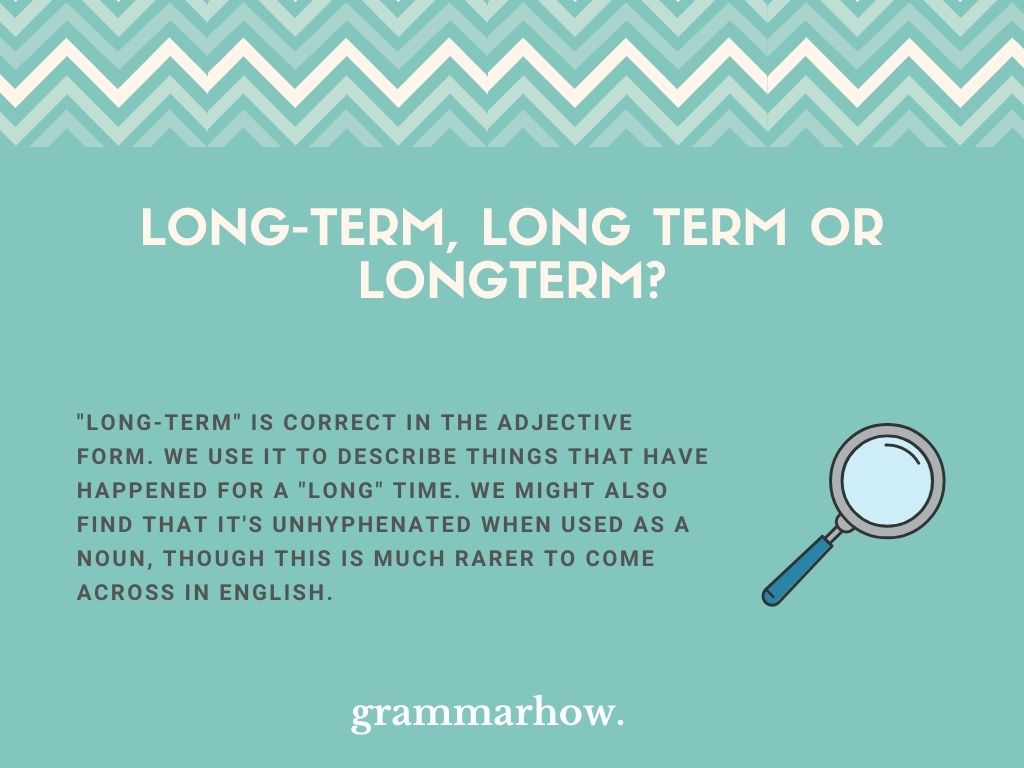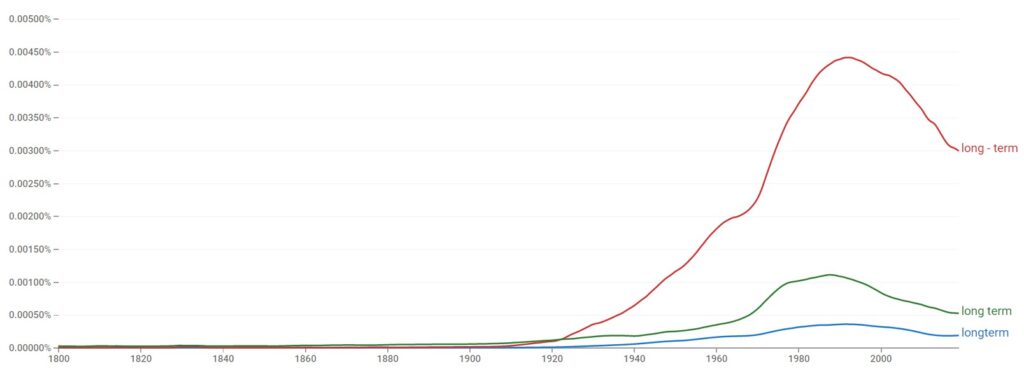“Long-term” is something you might come across, but you might not be sure whether to keep it hyphenated. This article will explore whether it’s one or two words and what you need to know about it when you use it.
Longterm vs. Long term vs. Long-term
“Long-term” is correct in the adjective form. We use it to describe things that have happened for a “long” time. We might also find that it’s unhyphenated when used as a noun, though this is much rarer to come across in English.

According to Google Ngram Viewer, “long-term” is the most popular spelling choice of the three. “Longterm” as one word is rarely used, and the noun form “long term” doesn’t see much usage in common English either.

In The Cambridge Dictionary and The Oxford Dictionary, “long-term” is officially defined with the hyphen. It is used as an adjective whenever it is written in this way. Therefore, we must remember to include it when spelling it.
However, it is also noted that “long term” is a noun and should be written in two words. This is done because we do not use nouns to modify other nouns in a sentence, so hyphens are not required in this case.
Is “Longterm” One Word?
“Longterm” is never written as one word. Since it’s officially defined and written with a hyphen, we must always make sure that we’re using the adjective form with a hyphen whenever we can. The one-word option is not grammatically correct.
So that we don’t spend too much time talking about this incorrect form, you can just refer to the following examples to help you out:
- Correct: The long-term effects of this procedure have been explained to you already.
- Incorrect: We are longterm friends, and that’s why we do so well together.
- Correct: I have long-term enemies that would love to see me fail in life!
- Incorrect: This is my longterm disease, and I’ve lived with it for as long as I can remember.
The hyphen isn’t just a style choice. We must use it whenever we modify a noun.
Is “Long term” Two Words?
“Long term” is two words when used as a noun phrase. If it is not modifying another noun in the sentence, we can use it as a standalone noun. However, if ever we write it as an adjective, we must always include the hyphen; otherwise, it’s grammatically incorrect.
It’s usually quite easy to tell when we use a noun rather than an adjective. A noun is a standalone word, while the adjective usually has a noun following it:
- Adjective: We are long-term friends
- Noun: In the long term, I don’t see this working.
Let’s go over a couple more examples to see how it works:
- In the long term, I think it would be best if you avoided talking to her.
- You should think more in the long term. Then you’ll have a better idea of what you’ll be doing.
- We need to discuss the long term. After all is said and done, what will happen to us?
- Are you thinking long term? I feel like you forget about our future.
Is “Long-term” Hyphenated?
“Long-term” is hyphenated as an adjective. It’s most common to write is as an adjective (which means we use it to modify a noun). The noun can come before or after the hyphenated word, but the meaning will always remain the same.
AP Stylebook guidelines teach us all we need to know about hyphens. They show that two or more words can be linked with each other when they are all used to describe or modify the same noun in a sentence.
Following these rules, you might benefit from these examples:
- Are you long-term buddies, or are you brand-new?
- I have a few long-term employees that I think are due for a promotion.
- We need to agree to some long-term rules about what we’re going to get done here.
- The long-term accounts of this company are a mess!
Is “Term” Capitalized In The Word “Long-Term”?
“Term” does not need to be capitalized in “long-term” because it is not a proper noun. However, if we write it in a title, it might be appropriate to capitalize both parts of the hyphen. This only applies if you choose to capitalize every other word in the title, though.

Martin holds a Master’s degree in Finance and International Business. He has six years of experience in professional communication with clients, executives, and colleagues. Furthermore, he has teaching experience from Aarhus University. Martin has been featured as an expert in communication and teaching on Forbes and Shopify. Read more about Martin here.
